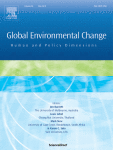
Sustainability transformations: socio-political shocks as opportunities for governance transitions
Herrfahrdt-Pähle, Elke / Maja Schlüter / Per Olsson / Carl Folke / Stefan Gelcich / Claudia Pahl-WostlExternal Publications (2020)
in: Global Environmental Change (63), article 102097
DOI: https://doi.org/10.1016/j.gloenvcha.2020.102097
Volltext/Document
Faced with accelerating environmental challenges, research on social-ecological systems is increasingly focused on the need for transformative change towards sustainable stewardship of natural resources. This paper analyses the potential of rapid, large-scale socio-political change as a window of opportunity for transformative change of natural resources governance. We hypothesize that shocks at higher levels of social organization may open up opportunities for transformation of social-ecological systems into new pathways of development. However, opportunities need to be carefully navigated otherwise transformations may stall or lead the social-ecological system in undesirable directions. We investigate (i) under which circumstances socio-political change has been used by actors as a window of opportunity for initiating transformation towards sustainable natural resource governance, (ii) how the different levels of the systems (landscape, regime and niche) interact to pave the way for initiating such transformations and (iii) which key features (cognitive, structural and agency-related) get mobilized for transformation. This is achieved through analyzing natural resource governance regimes of countries that have been subject to rapid, large-scale political change: water governance in South Africa and Uzbekistan and governance of coastal fisheries in Chile. In South Africa the political and economic change of the end of the apartheid regime resulted in a transformation of the water governance regime while in Uzbekistan after the breakdown of the Soviet Union change both at the economic and political scales and within the water governance regime remained superficial. In Chile the democratization process after the Pinochet era was used to transform the governance of coastal fisheries. The paper concludes with important insight on key capacities needed to navigate transformation towards biosphere stewardship. The study also contributes to a more nuanced view on the relationship between collapse and renewal.

